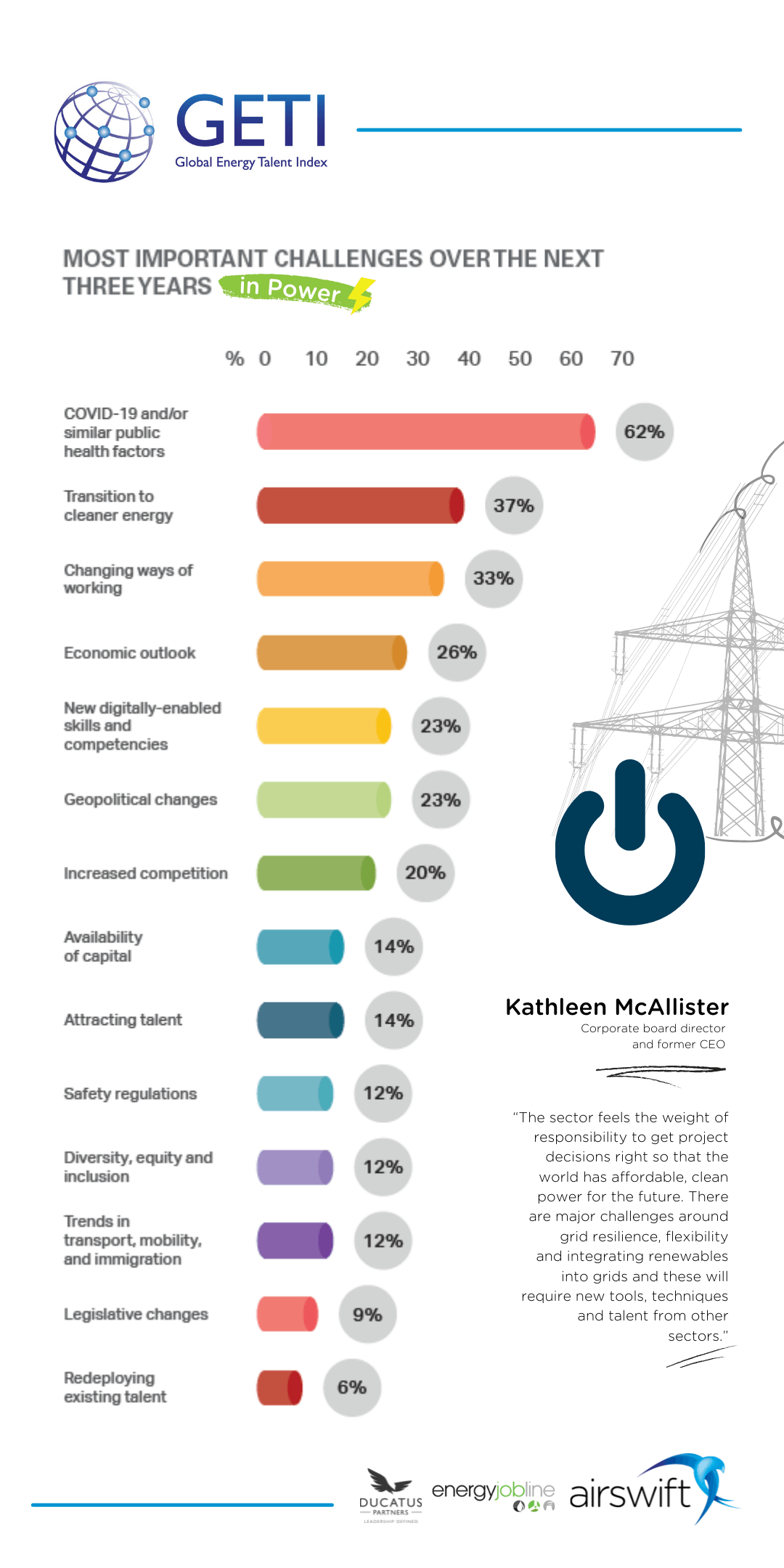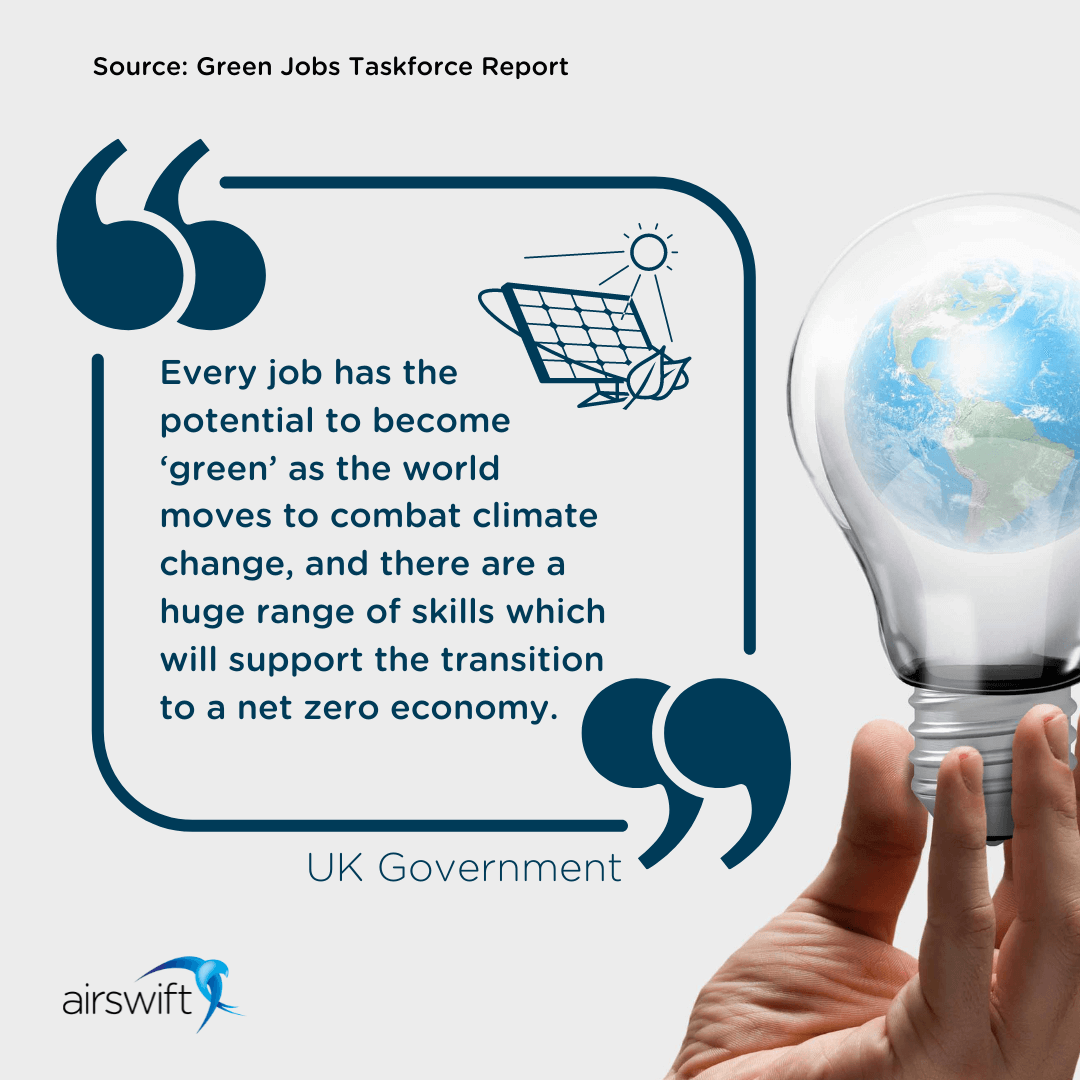
By
Raphael Santos
May 26, 2022
Updated
January 28, 2025
High-quality talent plays a vital role in developing a more reliable clean energy future for the economy
As we see more efforts by nations to reduce carbon emissions above pre-industrial levels, the more the energy industry is being transformed.
The goals settled during the Paris Agreement are uniting the public and private sectors, and with that, new clean technologies are emerging and becoming more accessible. So, a new skilled workforce is being demanded to lead the maturation of climate tech companies and across the electric power industry.
But first things first, what exactly is a skilled workforce?
A skilled workforce is a personnel group with good-quality education (usually a formal one) who can also use this knowledge as a foundation for future training. They can perform their tasks with excellence and thus, exceed expectations.
What is an example of a skilled worker?
It is common to find in these professionals the following types of macro skills:
- Foundation Skills
These are the most solid and essential skills of the employee. They are also the ones that work very well to pave the way for developing new skills.
- Transferable Skills
Here we have the skills that can be used across a variety of roles and jobs. These skills are adaptable and suitable for new challenges.
- Technical and Vocational Skills
The highly-skilled workforce can show proficiency in performing a specific skill for a particular problem.
What are the benefits of a skilled workforce?
The energy industry is undergoing a significant transformation. As a result, a skilled workforce is crucial to carry out this transition and show a natural adaptation to consequent changes.
In an increasingly competitive market where people are the greatest asset, having outstanding professionals is a turning point for any business.
What is the benefit in hiring multi-skilled personnel?
A multi-skilled workforce can remarkably improve the cost-effectiveness of your business. Not to mention the flexibility this can generate and the reliability of having a high-performance team.
The new tech workforce is "greening"
We have already talked about how there is a global task force in the industry today to reach net-zero emissions by 2050.
This has integrated different markets and encouraged transversality in professional roles. In other words, all industrial growth now is happening in a clean energy economy, which leads to the emergence of a workforce profile aligned with the best sustainable practices.
 Source: Frame Stock Footage/Shutterstock
Source: Frame Stock Footage/Shutterstock
Why is it important to have an adaptable workforce in a global economy?
One of the precise demands made by the market is that skills should be transversal. With technology and energy sectors increasingly converging, it is very important that workers can, in a short time, show results while adapting to both segments.
In addition, within a global context, those markets face new horizons for the future of work. Remote work and the resultant plurality of teams request a more diverse set of soft skills such as self-management, and concise and effective communication.
The world is now everyone's market, and this will require adaptability. Therefore, those who will stand out the most will be the ones most likely in learning to learn.
How can we improve our skills development program for green jobs?
The demand for a new energy workforce grows as the existing workforce ages and retires. For instance, a forecast in the UK shows that up to 400,000 new energy workers will have to be recruited by 2050 to fill vacancies that don't exist yet.
This shows how we need to anticipate training strategies to eliminate these skill gaps. Apprenticeship Programs seem to be a good solution in this transition process because they can prevent new ones from losing important knowledge of these senior workers.
Also, another good alternative is the Skills Bootcamps, which can serve to upskill and reskill professionals in a short period of time.
It is also inevitable that the industry collaborates with the public sector to help identify the skills in-demand no the new electrical grid. And as mentioned, it's crucial to analyze the data pointing to this new talent transition.
That's why we study every year the energy sector and release a full report called Global Energy Talent Index (GETI) to clear our sight on the various aspects of the new energy workforce.
How does a skilled workforce help improve power reliability?
Due to the number of decentralized power sources, the complexity of the current electricity grid has been demanding more attention and a skilled workforce. Pre-engineered reference designs and a power management system are two big improvements the electrical network needs to have to nurture its reliability.
As we see the energy transition gain scale, the power sector is becoming a cross-sector, bringing together technology and renewables by developing clean smart grids.
This ultimately requires more investments in software development and data analysis. A connected and intelligent network can identify possible risks and avoid them, optimizing its operation and maintenance.
Therefore, a skilled workforce will be a key factor for many projects in the power sector. Since there is this necessity for interchangeable skills across various niches and adaptability plus mobility as the industry keeps evolving its work relations.
Most important challenges over the next three years in the power sector
With GETI, we listened to almost 1,000 energy professionals to understand the main challenges of the next three years in the sector.
It's interesting to note how, again, power reliability will be linked to the ability of the new workforce to adapt and explore new clean technologies.

Trends in transport, mobility and immigration appears with 12% in the list. Undoubtedly, the changes that have been taking place in labor relations and the constant hunt for diverse talent reveal how companies have eyes on the benefits of the migration of new energy workers.
What are the benefits of increased immigration?
We're talking about a cross-sector now, which implicates that the power segment will attract professionals from every side of the globe.
The new smart grid will be more complex and increasingly integrated. A more global view of the workforce makes sense in a world where the goal of reducing carbon emissions becomes everyone's task.
Hence, more immigration will inevitably bring more innovation, specialization to unique activities, and a perfect match between job and employee. In the end, what we will have is an increase in productivity and a much more interesting cost-effective ratio for green tech startups.
Net-zero transition will need more engineering and technology skills
According to the Green Jobs Taskforce, a report released in 2021 by the British Government, engineering and technology skills will be vital to the next waves of energy jobs.
The document was produced jointly by the Department of Business, Energy and the Industrial Strategy (BEIS) and the Department for Education (DfE). It aims to support the UK's transition to net-zero by 2030.
The publication points to the need for investments in education programs capable of training more professionals with engineering and technology skills since there is a low supply of this type of college graduates. Also, it is necessary to access a larger talent pool to meet the growing demand.

We will see more and more scientists paving the way for innovation in new technologies while researching climate adaptation. And on the other side, we will have more engineers in demand to find solutions to the challenges of decarbonization, as they work on complex systems for enhancing buildings for climate adaptation.
Skills beyond engineering and technology
So, engineering and technology will be critical to reaching net-zero and bringing more reliability for the electric power industry. But besides those skills, others will play an important role in accelerating the energy transition, according to the same report.
- Digital and data skills
As we go along in deploying smart grid infrastructures, digital skills will be necessary for developing an even more reliable system. The investments in renewable electricity must increase the storage capacity and flexibility for better managing of EVs, home heating systems, wind farms, hydrogen technologies, and others. - Project Management
Here we have an excellent example of a skill set that is "greening". Sectors such as financial and technology will become more net-zero driven and require managers with that vision in mind. - Education communication and change management
In the private and public sectors, educators must create learning paths more suited to the converging objectives of a green economy. - Leadership, management, and communication skills
Experts in communication will play a fundamental role in directing the values and branding of organizations to a more sustainable vision.
We can help you with a skilled engineering and technology workforce
Reliable power is being addressed as an important issue of our time. Renewable energy sources demand a new workforce profile, and technology increases the demand for cross-cutting skills across all sectors.
 Source: Frame Stock Footage/Shutterstock
Source: Frame Stock Footage/Shutterstock
STEM professionals lead and create shortcuts to advanced technologies, which can change forecasts and bring us even closer to a net-zero economy. That's why green techs must be aware and improve their hiring and retention strategies.
We at Airswift can help you find the best workforce globally and enhance your business. With over 9,000 contractors and 60 offices worldwide, we have the experience and know-how needed for your expansion.


